Examining US Foreign Policy, Latin America, and Democracy
VerifiedAdded on 2023/01/16
|6
|1240
|66
Homework Assignment
AI Summary
This paper examines US foreign policy, particularly focusing on its relationship with Latin America. The analysis begins with Donald Trump's foreign policy, highlighting his "America First" approach and its implications for the region, including the US-Mexico border. The paper then delves into the historical context, discussing the evolution of US imperialism and its connection to the Monroe Doctrine, territorial expansion, and the concept of "hemisphere hegemony." The author explores how the gospel of democracy has been used to legitimize US expansionist policies and maintain its global influence. The paper also analyzes the process of recolonization in Latin America, referencing James Petras's work and focusing on the recolonization of Latin American countries and the driving forces of the colony, and questions the U.S. capability in maintaining its hegemony. The paper concludes by reiterating the role of democracy in legitimizing US imperialist policies and its pursuit of global dominance. It provides a historical understanding of the process of recolonization and how it has shaped their image in the international system.
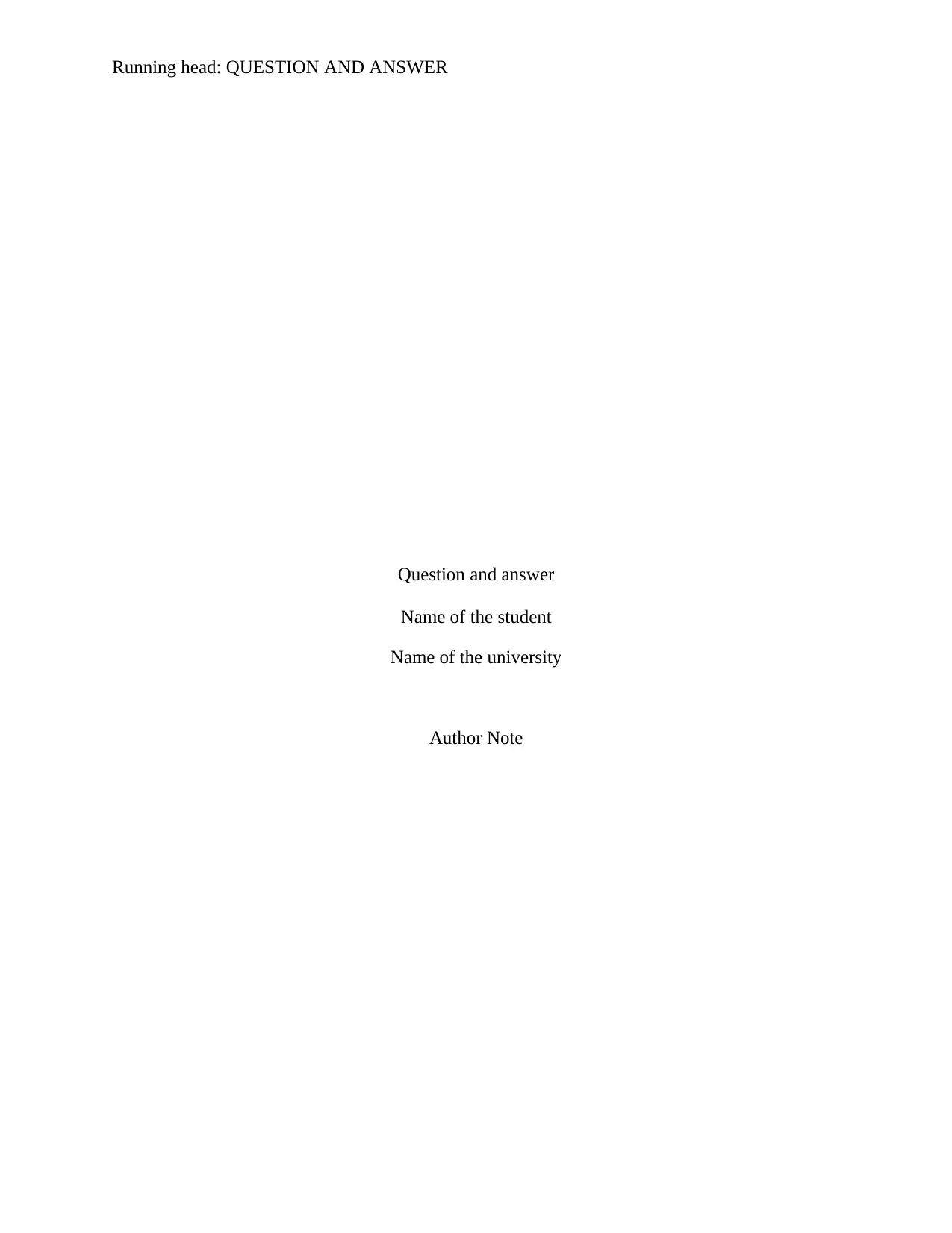
Running head: QUESTION AND ANSWER
Question and answer
Name of the student
Name of the university
Author Note
Question and answer
Name of the student
Name of the university
Author Note
Paraphrase This Document
Need a fresh take? Get an instant paraphrase of this document with our AI Paraphraser
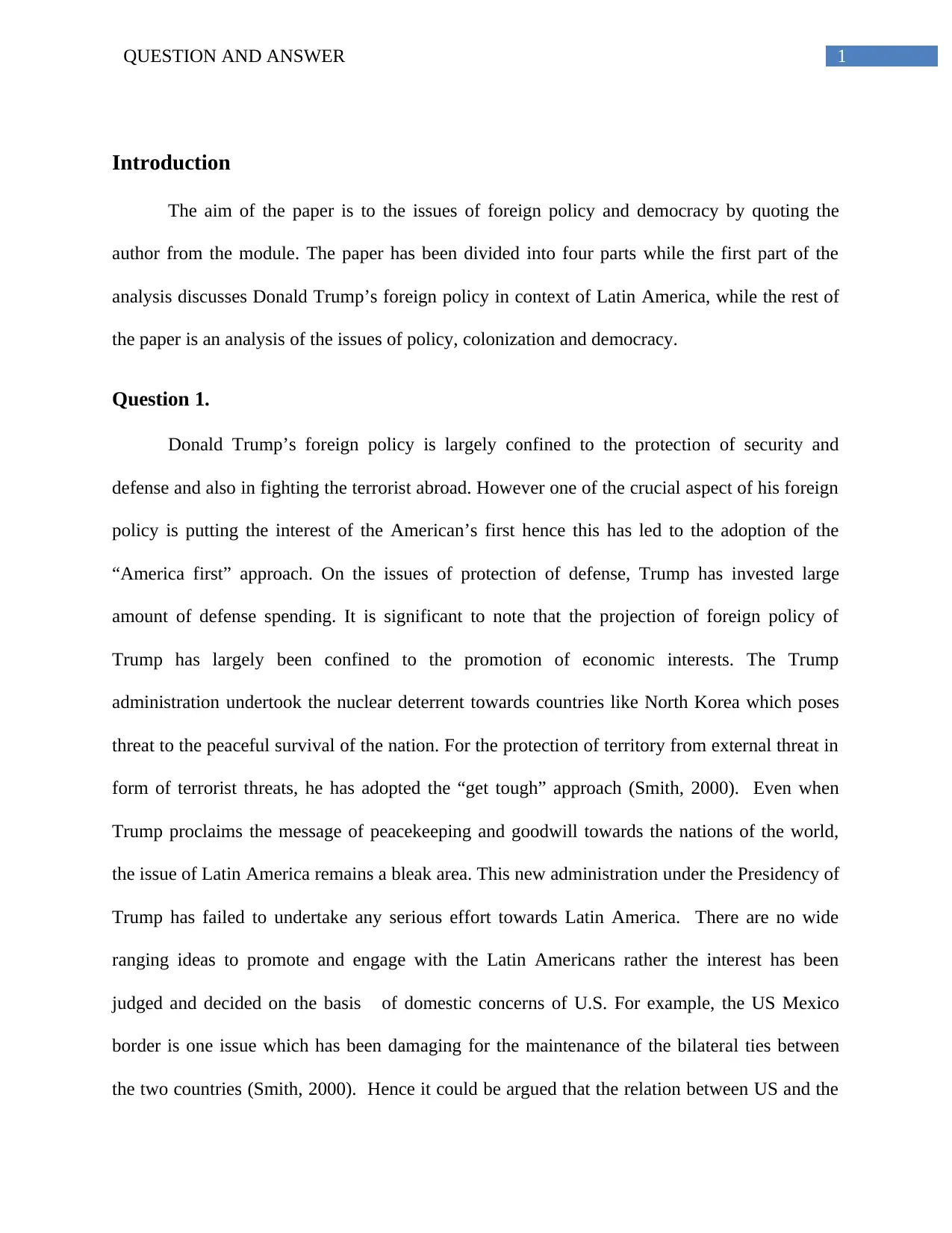
1QUESTION AND ANSWER
Introduction
The aim of the paper is to the issues of foreign policy and democracy by quoting the
author from the module. The paper has been divided into four parts while the first part of the
analysis discusses Donald Trump’s foreign policy in context of Latin America, while the rest of
the paper is an analysis of the issues of policy, colonization and democracy.
Question 1.
Donald Trump’s foreign policy is largely confined to the protection of security and
defense and also in fighting the terrorist abroad. However one of the crucial aspect of his foreign
policy is putting the interest of the American’s first hence this has led to the adoption of the
“America first” approach. On the issues of protection of defense, Trump has invested large
amount of defense spending. It is significant to note that the projection of foreign policy of
Trump has largely been confined to the promotion of economic interests. The Trump
administration undertook the nuclear deterrent towards countries like North Korea which poses
threat to the peaceful survival of the nation. For the protection of territory from external threat in
form of terrorist threats, he has adopted the “get tough” approach (Smith, 2000). Even when
Trump proclaims the message of peacekeeping and goodwill towards the nations of the world,
the issue of Latin America remains a bleak area. This new administration under the Presidency of
Trump has failed to undertake any serious effort towards Latin America. There are no wide
ranging ideas to promote and engage with the Latin Americans rather the interest has been
judged and decided on the basis of domestic concerns of U.S. For example, the US Mexico
border is one issue which has been damaging for the maintenance of the bilateral ties between
the two countries (Smith, 2000). Hence it could be argued that the relation between US and the
Introduction
The aim of the paper is to the issues of foreign policy and democracy by quoting the
author from the module. The paper has been divided into four parts while the first part of the
analysis discusses Donald Trump’s foreign policy in context of Latin America, while the rest of
the paper is an analysis of the issues of policy, colonization and democracy.
Question 1.
Donald Trump’s foreign policy is largely confined to the protection of security and
defense and also in fighting the terrorist abroad. However one of the crucial aspect of his foreign
policy is putting the interest of the American’s first hence this has led to the adoption of the
“America first” approach. On the issues of protection of defense, Trump has invested large
amount of defense spending. It is significant to note that the projection of foreign policy of
Trump has largely been confined to the promotion of economic interests. The Trump
administration undertook the nuclear deterrent towards countries like North Korea which poses
threat to the peaceful survival of the nation. For the protection of territory from external threat in
form of terrorist threats, he has adopted the “get tough” approach (Smith, 2000). Even when
Trump proclaims the message of peacekeeping and goodwill towards the nations of the world,
the issue of Latin America remains a bleak area. This new administration under the Presidency of
Trump has failed to undertake any serious effort towards Latin America. There are no wide
ranging ideas to promote and engage with the Latin Americans rather the interest has been
judged and decided on the basis of domestic concerns of U.S. For example, the US Mexico
border is one issue which has been damaging for the maintenance of the bilateral ties between
the two countries (Smith, 2000). Hence it could be argued that the relation between US and the
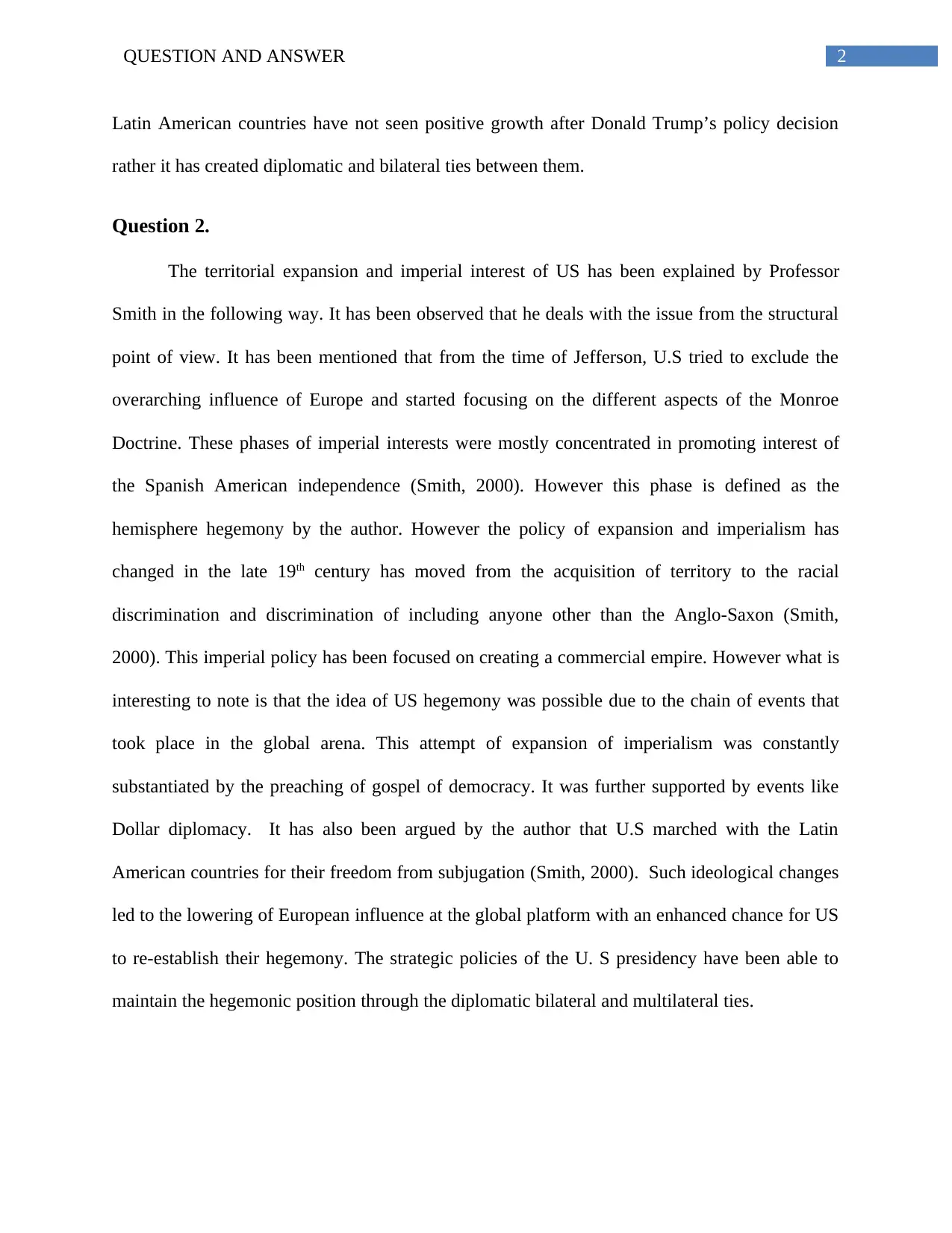
2QUESTION AND ANSWER
Latin American countries have not seen positive growth after Donald Trump’s policy decision
rather it has created diplomatic and bilateral ties between them.
Question 2.
The territorial expansion and imperial interest of US has been explained by Professor
Smith in the following way. It has been observed that he deals with the issue from the structural
point of view. It has been mentioned that from the time of Jefferson, U.S tried to exclude the
overarching influence of Europe and started focusing on the different aspects of the Monroe
Doctrine. These phases of imperial interests were mostly concentrated in promoting interest of
the Spanish American independence (Smith, 2000). However this phase is defined as the
hemisphere hegemony by the author. However the policy of expansion and imperialism has
changed in the late 19th century has moved from the acquisition of territory to the racial
discrimination and discrimination of including anyone other than the Anglo-Saxon (Smith,
2000). This imperial policy has been focused on creating a commercial empire. However what is
interesting to note is that the idea of US hegemony was possible due to the chain of events that
took place in the global arena. This attempt of expansion of imperialism was constantly
substantiated by the preaching of gospel of democracy. It was further supported by events like
Dollar diplomacy. It has also been argued by the author that U.S marched with the Latin
American countries for their freedom from subjugation (Smith, 2000). Such ideological changes
led to the lowering of European influence at the global platform with an enhanced chance for US
to re-establish their hegemony. The strategic policies of the U. S presidency have been able to
maintain the hegemonic position through the diplomatic bilateral and multilateral ties.
Latin American countries have not seen positive growth after Donald Trump’s policy decision
rather it has created diplomatic and bilateral ties between them.
Question 2.
The territorial expansion and imperial interest of US has been explained by Professor
Smith in the following way. It has been observed that he deals with the issue from the structural
point of view. It has been mentioned that from the time of Jefferson, U.S tried to exclude the
overarching influence of Europe and started focusing on the different aspects of the Monroe
Doctrine. These phases of imperial interests were mostly concentrated in promoting interest of
the Spanish American independence (Smith, 2000). However this phase is defined as the
hemisphere hegemony by the author. However the policy of expansion and imperialism has
changed in the late 19th century has moved from the acquisition of territory to the racial
discrimination and discrimination of including anyone other than the Anglo-Saxon (Smith,
2000). This imperial policy has been focused on creating a commercial empire. However what is
interesting to note is that the idea of US hegemony was possible due to the chain of events that
took place in the global arena. This attempt of expansion of imperialism was constantly
substantiated by the preaching of gospel of democracy. It was further supported by events like
Dollar diplomacy. It has also been argued by the author that U.S marched with the Latin
American countries for their freedom from subjugation (Smith, 2000). Such ideological changes
led to the lowering of European influence at the global platform with an enhanced chance for US
to re-establish their hegemony. The strategic policies of the U. S presidency have been able to
maintain the hegemonic position through the diplomatic bilateral and multilateral ties.
⊘ This is a preview!⊘
Do you want full access?
Subscribe today to unlock all pages.

Trusted by 1+ million students worldwide
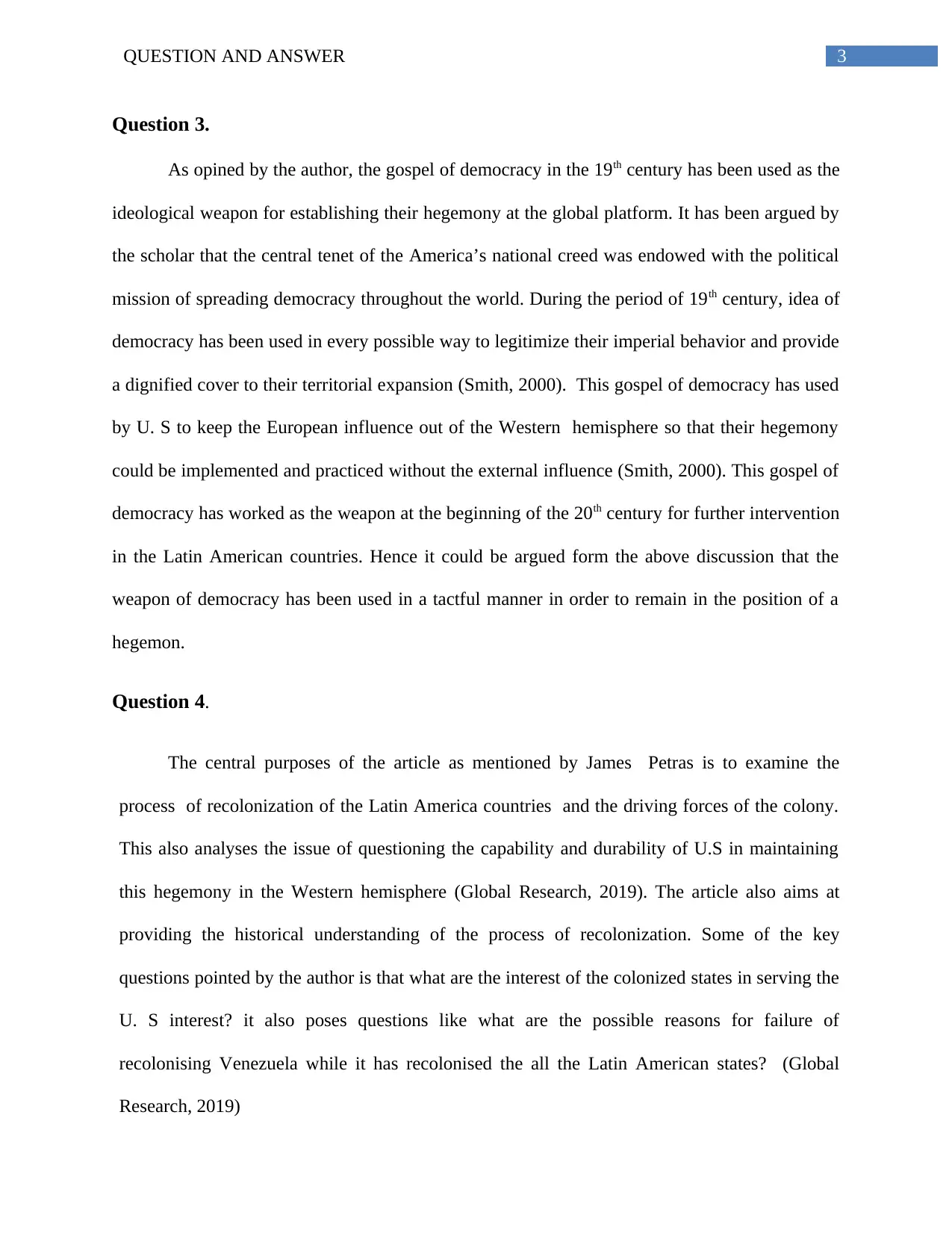
3QUESTION AND ANSWER
Question 3.
As opined by the author, the gospel of democracy in the 19th century has been used as the
ideological weapon for establishing their hegemony at the global platform. It has been argued by
the scholar that the central tenet of the America’s national creed was endowed with the political
mission of spreading democracy throughout the world. During the period of 19th century, idea of
democracy has been used in every possible way to legitimize their imperial behavior and provide
a dignified cover to their territorial expansion (Smith, 2000). This gospel of democracy has used
by U. S to keep the European influence out of the Western hemisphere so that their hegemony
could be implemented and practiced without the external influence (Smith, 2000). This gospel of
democracy has worked as the weapon at the beginning of the 20th century for further intervention
in the Latin American countries. Hence it could be argued form the above discussion that the
weapon of democracy has been used in a tactful manner in order to remain in the position of a
hegemon.
Question 4.
The central purposes of the article as mentioned by James Petras is to examine the
process of recolonization of the Latin America countries and the driving forces of the colony.
This also analyses the issue of questioning the capability and durability of U.S in maintaining
this hegemony in the Western hemisphere (Global Research, 2019). The article also aims at
providing the historical understanding of the process of recolonization. Some of the key
questions pointed by the author is that what are the interest of the colonized states in serving the
U. S interest? it also poses questions like what are the possible reasons for failure of
recolonising Venezuela while it has recolonised the all the Latin American states? (Global
Research, 2019)
Question 3.
As opined by the author, the gospel of democracy in the 19th century has been used as the
ideological weapon for establishing their hegemony at the global platform. It has been argued by
the scholar that the central tenet of the America’s national creed was endowed with the political
mission of spreading democracy throughout the world. During the period of 19th century, idea of
democracy has been used in every possible way to legitimize their imperial behavior and provide
a dignified cover to their territorial expansion (Smith, 2000). This gospel of democracy has used
by U. S to keep the European influence out of the Western hemisphere so that their hegemony
could be implemented and practiced without the external influence (Smith, 2000). This gospel of
democracy has worked as the weapon at the beginning of the 20th century for further intervention
in the Latin American countries. Hence it could be argued form the above discussion that the
weapon of democracy has been used in a tactful manner in order to remain in the position of a
hegemon.
Question 4.
The central purposes of the article as mentioned by James Petras is to examine the
process of recolonization of the Latin America countries and the driving forces of the colony.
This also analyses the issue of questioning the capability and durability of U.S in maintaining
this hegemony in the Western hemisphere (Global Research, 2019). The article also aims at
providing the historical understanding of the process of recolonization. Some of the key
questions pointed by the author is that what are the interest of the colonized states in serving the
U. S interest? it also poses questions like what are the possible reasons for failure of
recolonising Venezuela while it has recolonised the all the Latin American states? (Global
Research, 2019)
Paraphrase This Document
Need a fresh take? Get an instant paraphrase of this document with our AI Paraphraser
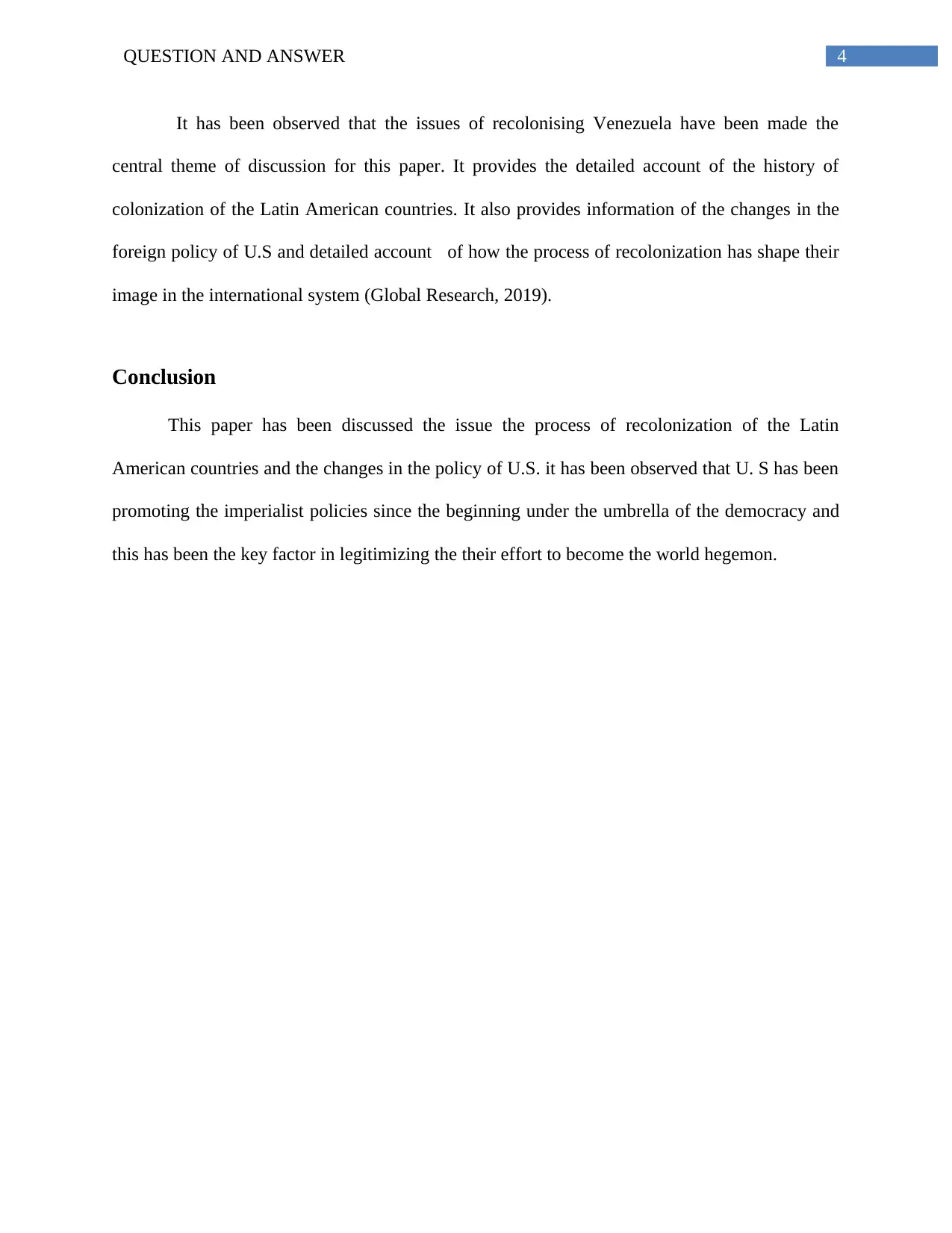
4QUESTION AND ANSWER
It has been observed that the issues of recolonising Venezuela have been made the
central theme of discussion for this paper. It provides the detailed account of the history of
colonization of the Latin American countries. It also provides information of the changes in the
foreign policy of U.S and detailed account of how the process of recolonization has shape their
image in the international system (Global Research, 2019).
Conclusion
This paper has been discussed the issue the process of recolonization of the Latin
American countries and the changes in the policy of U.S. it has been observed that U. S has been
promoting the imperialist policies since the beginning under the umbrella of the democracy and
this has been the key factor in legitimizing the their effort to become the world hegemon.
It has been observed that the issues of recolonising Venezuela have been made the
central theme of discussion for this paper. It provides the detailed account of the history of
colonization of the Latin American countries. It also provides information of the changes in the
foreign policy of U.S and detailed account of how the process of recolonization has shape their
image in the international system (Global Research, 2019).
Conclusion
This paper has been discussed the issue the process of recolonization of the Latin
American countries and the changes in the policy of U.S. it has been observed that U. S has been
promoting the imperialist policies since the beginning under the umbrella of the democracy and
this has been the key factor in legitimizing the their effort to become the world hegemon.
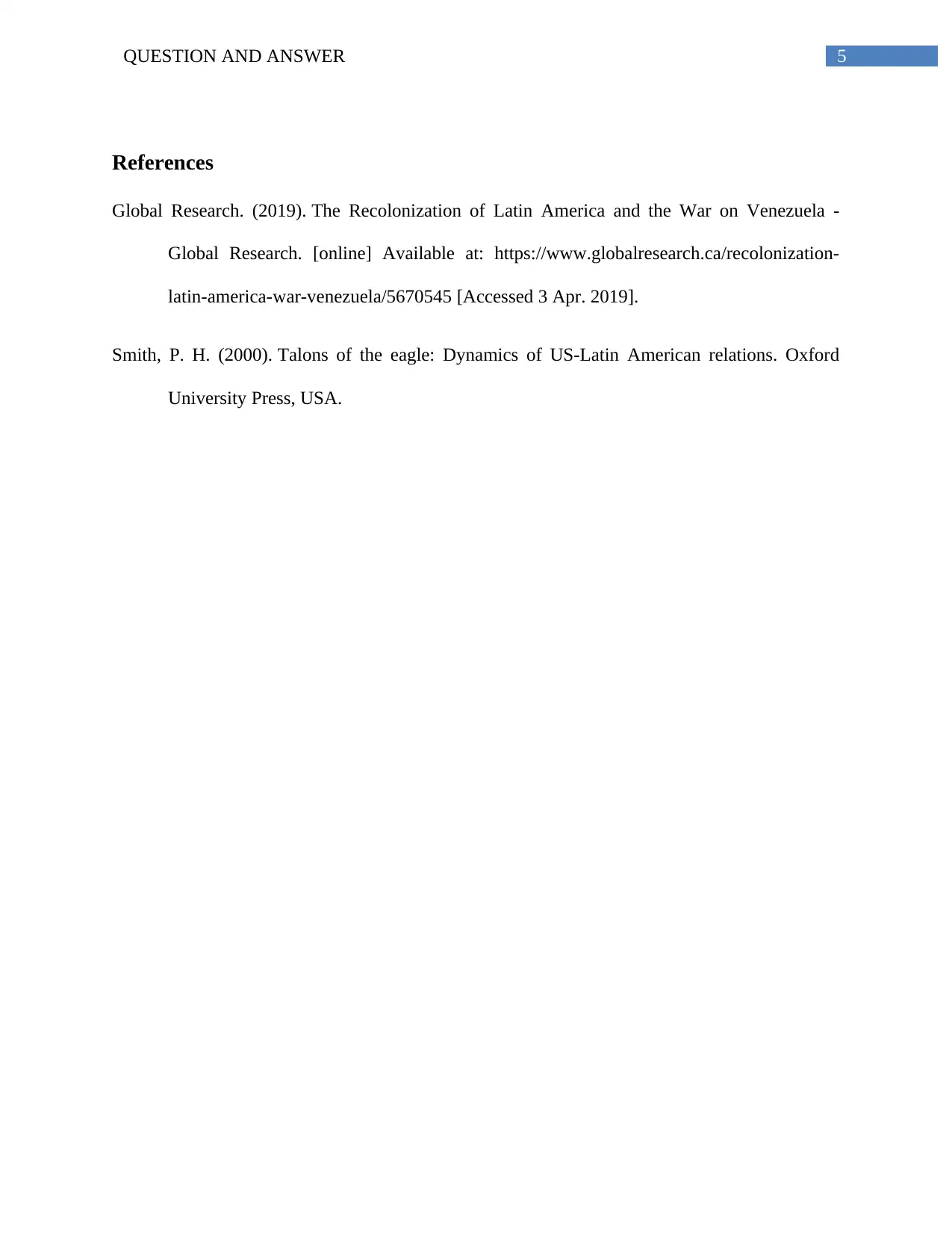
5QUESTION AND ANSWER
References
Global Research. (2019). The Recolonization of Latin America and the War on Venezuela -
Global Research. [online] Available at: https://www.globalresearch.ca/recolonization-
latin-america-war-venezuela/5670545 [Accessed 3 Apr. 2019].
Smith, P. H. (2000). Talons of the eagle: Dynamics of US-Latin American relations. Oxford
University Press, USA.
References
Global Research. (2019). The Recolonization of Latin America and the War on Venezuela -
Global Research. [online] Available at: https://www.globalresearch.ca/recolonization-
latin-america-war-venezuela/5670545 [Accessed 3 Apr. 2019].
Smith, P. H. (2000). Talons of the eagle: Dynamics of US-Latin American relations. Oxford
University Press, USA.
⊘ This is a preview!⊘
Do you want full access?
Subscribe today to unlock all pages.

Trusted by 1+ million students worldwide
1 out of 6
Related Documents
Your All-in-One AI-Powered Toolkit for Academic Success.
+13062052269
info@desklib.com
Available 24*7 on WhatsApp / Email
![[object Object]](/_next/static/media/star-bottom.7253800d.svg)
Unlock your academic potential
Copyright © 2020–2026 A2Z Services. All Rights Reserved. Developed and managed by ZUCOL.




